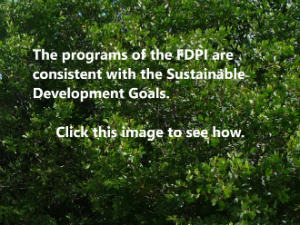By Axel Grava March 20, 2020
Sustainable Development Goal 6 focuses on the need to “Ensure availability and sustainable management of water and sanitation for all“. That goal is difficult to achieve in Small Island Developing States (SIDS), such as Guadeloupe, which are likely to experience water shortages. 71% to 91% of low-lying SIDS face the risk of water shortage, with 73% facing the risk of groundwater pollution (UNESCO 2019).
Towards the end of 2019, the news in Guadeloupe regularly highlighted the water-related problems, such as; obsolescence of the networks, contamination of aquifers, and dysfunction of sanitation systems. Data from the dedicated report of the Water Office corroborate the news, highlighting the technical aspects of the problem, including:
- 18.6% of bacteriological tests are non-compliant.
- 73% of wastewater treatment plants are non-compliant.
- 62% of the volume of water that is produced (74.2 Mm3) is lost, leaving 28.2 Mm3 for consumption.
- Paradoxically, the Basse Terre area (and especially Capesterre), which supplies nearly 90% of the volume of water withdrawn, is one of the areas most prone to disruption in supply.
A detailed analysis of other water data produces a global perspective:
- Average water price in Guadeloupe in 2018 was €3.16/m3 against €2.81/m3 in Martinique.
- The relative rate of arrears by ratepayers in 2015 was 38.3% in Guadeloupe against 1.1% in France Hexagonal (mainland/metropolitan France).
Going beyond the reactive management of the water emergency to integration of issues such as risk, global warming and biodiversity, implies that the response to the water problem is essentially one of sustainable urban planning.
2019 Seminar on Water and Sustainable Planning
The Water Office, the Council of Architecture, Urban Planning, and Environment (CAUE) of Guadeloupe, and their partners in the Sustainable Urban Planning Network of Guadeloupe, organized, on December 5-6, 2019, a seminar on integrating the cross-cutting issues of water in planning initiatives.
The seminar brought together the institutional, professional, and civil actors dealing with water and planning issues, to generate, through presentations, site visits, and peer interactions, responses that could improve local practices and knowledge.
The local water partnership and its partners focused on the scientific and policy tools necessary to counter water vulnerability and quality, as well as the appropriate convergence of actors and policies to optimize integration of water in territorial planning.
Two frameworks were identified as contributing to optimal management of water as both resource and risk in development planning, namely:
- The Master Water Development and Management Plan (SDAGE 2016-2021), which recommends assistance to the operators managing water works, the establishment of a single trade union, the compliance of Wastewater Treatment Plants, and general public information actions.
- The Aquatic Management and Flood Prevention (GEMAPI) authority entrusted to the inter-communal authorities, since 1 January 2018, by the laws on decentralization, no. 2014-58 of 27 January 2014 and no. 2015-991 of 7 August 2015. Outside the specific case of the PAPI des Grands Fonds, the authority is very unevenly implemented.
These two primary water management policy and legal frameworks are imperfectly considered in urban planning documents and projects.
To better understand some of the current dysfunctions, the seminar examined the ramifications of water integration in planning through the Basse Terre case, while a visit to Fort Delgrès (Baillif plant, Grande Ravine, and Choisy Bridge) allowed for examination of water integration in infrastructure projects.
In planning, the concern of designers since 1650 to combine a functional aesthetic (such as view or water system around castles) with security and strategic aspects has been retained. These provisions to address past threats require re-examination of the ways of building and planning our cities to address current and future threats (such as tsunami or viral attack).
The site visits also allowed seminar participants to examine the equipment needed for the treatment, delivery, and safe management of water to facilitate a collective transfer from an “all tributaries”, “all guilty” position, to an “all responsible” positioning.
International experts presented Caribbean models of water management and the links between sustainable planning and quality of the resource. Presentations covered topics such as; access to safe drinking water at the practical and locally applicable scale; the role of wetlands, particularly mangroves, in water resources management; and global warming as an “aggravating factor”.
Conclusion
As innovative and unifying as it may seem, the single water union, advocated in the Water Board’s Multi-annual Action Plan 2019-2024 was previously included in Guadeloupe’s 1976 urban development master plan. The same applies to protocols and policies for improving water management and better integration of the Master Water Development & Management Plan (SDAGE) into planning documents.
Therefore, it can be concluded that the seminar will contribute to better integration of cross-cutting water issues in the sustainable urban projects developed from Morne à l’Eau to Petit Bourg through Cap Excellence.
The CAUE and the Water Office should extend this action by new collaborations, while the Sustainable Urban Planning Network will facilitate an upcoming contribution of Guadeloupe to Global Waternet.
Sources of Information Cited
Aquatic Management and Flood Prevention (GEMAPI) Authority
Council of Architecture, Urban Planning and Environment of Guadeloupe (CAUE)
Global Waternet
https://www.globalwaternet.com/
Key Water and Sanitation Figures Report 2018 for Guadeloupe
Master Water Development and Management Plan
http://www.comite-de-bassin-guadeloupe.fr/sdage_telechargement.php
Multi-annual Action Plan for Water
http://www.eauguadeloupe.com/jupgrade/ppi/axes-strategiques.html
Sustainable Development Goals
https://sustainabledevelopment.un.org/sdgs
Sustainable Urban Planning Network of Guadeloupe
https://www.urbanismeguadeloupe.fr/
UNESCO. 2019. Small islands: meeting the challenges of freshwater resilience
https://en.unesco.org/news/small-islands-meeting-challenges-freshwater-resilience
Water Office Guadeloupe
http://www.eauguadeloupe.com/jupgrade/
Axel Grava is Facilitator of the Sustainable Urban Planning Network of Guadeloupe.
Disclaimer
The ideas and perspectives in the article are solely those of the author(s), and do not reflect the views or positions of the Foundation for Development Planning, Inc., its board of directors, its staff, its associates, or its collaborating partners.

No Comments Yet - be the First!